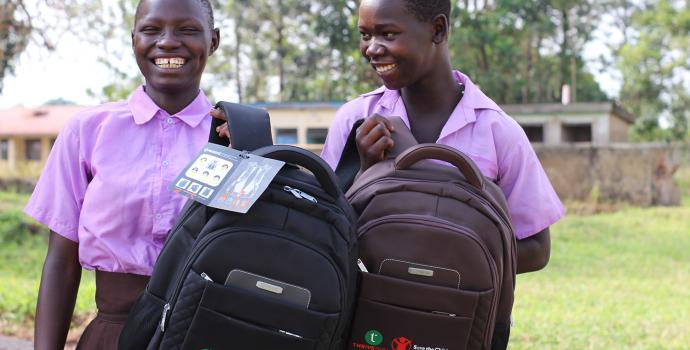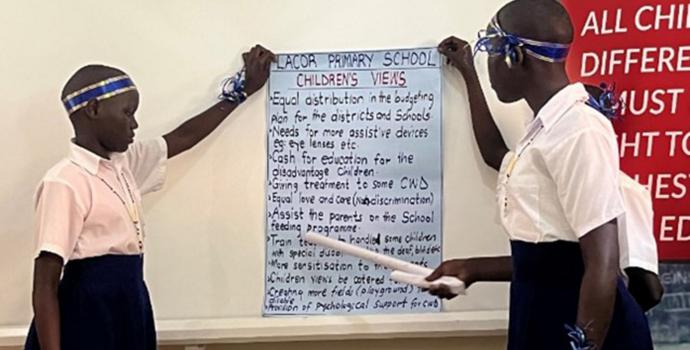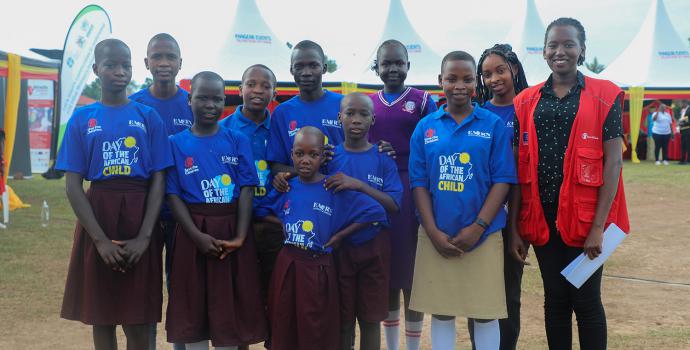The time to go green for a safe planet for children is now!

One of Save the Children staff plants a tree in Kiryandongo Refugee Settlement.
Preserving the environment is a child right and should be treated as such. Environmentalists predict that if we do not put measures in place to protect the environment today, we risk having irreversible and lifelong consequences. And in fact, children will inherit a planet with extreme weather conditions; long dry spells, flooding and destructive rains, among others. Climate crisis is a threat to children’s rights to a safe home, healthcare, food and learning.
There is no better time to act than now. Which is why Save the Children with support from the European Union Trust Fund will for four years campaign for regreening in response to increased environmental degradation.
SCI will promote increased use of clean energy products in refugee hosting districts of West Nile. This move will see 234,800 these refugee and host communities access alternative sources of cooking energy, environmentally sensitive livelihood opportunities, sustainable savings options aimed at decreasing demand and utilisation of natural resources from unsustainable and unregulated sources.
And we are not leaving children behind in this campaign. Mark, 8, says:
“When I think of a tree, I see shade, poles for building and firewood for my mother. If we want shade to play and firewood for my mother, me, my brother and my mother have got to plant trees and water them.”
And his mother says:
“Trees give us oxygen and without them, I see more death, not only because of lack of oxygen but lack of rainfall which will lead to drought, famine and eventually a lot of death. Save the Children should sensitise the community on deforestation which is a very common act in our community.”
We should remember that for every tree planted a child has a shade to play from, a mother has a sustainable source of fuel, a father has more income to provide for the family and the community has a better environment for farming and the next generation is saved and protected from living in a desert.
A mother needs eight hours to cook beans on cooking stones and takes in smoke equivalent to eight packets of cigarettes. Cooking the same on an energy saving stove, she only needs four hours and takes in less smoke.
Save the Children will through key messaging highlight the benefits of trees and amplify the dangers of cutting them and popularize alternative energy efficient technologies, show the dangers of the traditional three-stoned stove. In addition, the messages will highlight gender responsibilities on energy choices at household level and the dangers especially in women, social individual responsibilities for conserving the environment and channels of whistleblowing any dangerous actions.
How will the community be involved?
- Through already established Village Savings and Loans Associations, community members will form cooperatives in which they will be taught how to operate energy kiosks. These kiosks will serve as localised distributors of renewable energy goods.
- A youth innovation lab will be linked to the project energy hubs to co-create energy solutions with private sector energy companies tailored to the local energy needs.
- Social behavioural change approach which includes behavioural change communication, social mobilisation/community mobilisation and advocacy will be key in ensuring increased participation most especially of women, youth, and adolescents. These approaches will aim at changing individual behaviour, knowledge, attitudes and practices while interacting with the environment.
It is time to speak out about climate crisis!




